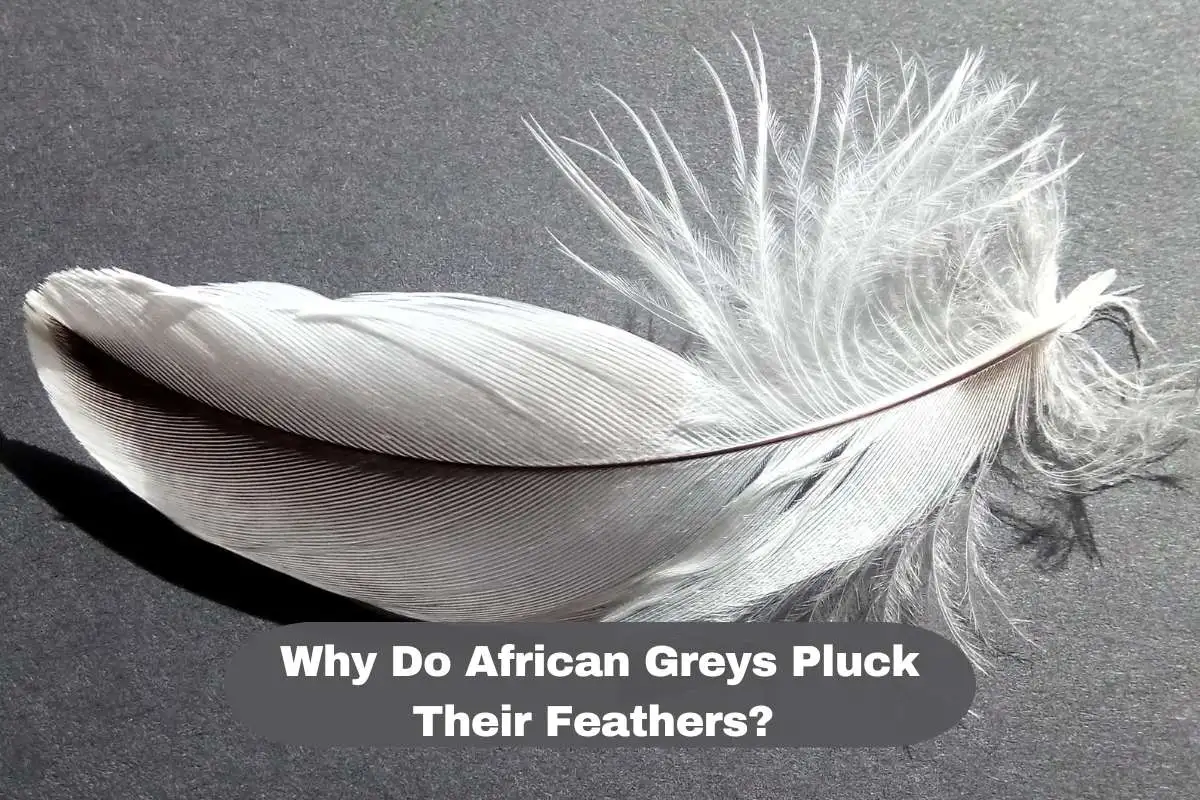African Grey parrots can pluck their feathers, which can seriously affect the bird’s health and well-being. So, if you have an African grey parrot, you are probably wondering why do African greys pluck their feathers?
Various factors, including medical conditions, environmental factors, and behavioral issues, can cause feather plucking in African Grey parrots. Understanding these underlying causes is important for addressing and preventing the behavior in these intelligent and social birds.
In this article, I will explore the factors that may contribute to feather plucking in African Grey parrots and offer tips and strategies for preventing and addressing this behavior, so keep reading.
The reasons behind feather plucking in African Grey parrots
One common cause of feather plucking in African Grey parrots is malnutrition. A diet lacking necessary nutrients, such as protein, fat, and vitamins, can lead to malnutrition.
Owners need to provide a well-balanced diet that includes a variety of fresh fruits, vegetables, and high-quality pelleted food.
Birds suffering from boredom, lack of attention can also leads to plucking of feathers. Owners should provide their birds with plenty of toys and activities to keep them mentally and physically engaged.
Training and socialization can also help prevent feather plucking by providing mental stimulation and strengthening the bond between the bird and its owner.
In my another article I have discusses more about the reason behind feather loosing in african grey parrot, you can read the article for better understanding.
How to address feather plucking behavior in African Grey parrots?
If you suspect your African Grey parrot is plucking its feathers, it is important to consult a veterinarian. After ruling out any medical causes for the behavior and treating any medical conditions that may be causing it, there are several steps you can take to address feather-plucking behavior in your parrot:
- Provide a well-balanced diet for your African Grey parrot. As mentioned earlier, malnutrition can be a contributing factor to feather plucking. Ensure your bird is eating a healthy diet rich in nutrients and variety.
- Providing your African Grey with a spacious, well-ventilated living environment and plenty of mental and physical stimulation opportunities will enhance the bird’s happiness.
- Spend time interacting with your African Grey parrot, providing socialization through training and play. It can help prevent boredom and strengthen the bond between you and your bird.
- If your African Grey is plucking its feathers due to loneliness or boredom, consider adding a companion bird to its environment.
- If you have tried the above steps and your African Grey is still plucking its feathers, consulting with a bird behaviorist may be helpful. A behaviorist can assess the underlying cause of the feather-plucking behavior and provide targeted strategies for addressing it.
The impact of feather plucking on the health and well-being of African Grey parrots
Feather plucking can have serious consequences for African Grey parrots. When a bird plucks its feathers, it can lead to bare patches on the skin. These patches can become infected or inflamed. Feather plucking also disrupts a bird’s ability to regulate its body temperature, increasing the risk of heat stroke or hypothermia. Severe cases of feather plucking can lead to death if left untreated.
It can be challenging to address feather-plucking behavior in African Grey parrots. However, by providing a well-balanced diet and addressing the other factors that contribute to feather plucking behavior, such as increased socialization and attention, you can successfully address feather plucking and promote your pet’s overall health and well-being.
Seeking professional help for African Grey feather plucking issues
If you have tried to help your African Grey parrot address feather plucking behavior on your own and have been unable to resolve the issue, it may be helpful to seek professional help. Many professionals may be able to assist with feather plucking issues in African Grey parrots:
- An avian veterinarian is a veterinarian who specializes in the care of birds. They can assess your African Grey’s overall health, rule out any medical causes for feather plucking, and provide recommendations for addressing feather plucking behavior.
- Bird behaviorists are trained in understanding and addressing bird behavior issues. They can assess the underlying cause of feather plucking behavior in your African Grey and provide targeted strategies for addressing it.
- An avian specialist is a professional who has extensive knowledge and experience working with birds. The opinion of a person with this kind of background can help address feather-plucking behavior and other issues related to the care of African Grey parrots.
Choosing a professional with experience working with African Grey parrots and a proven track record of success in addressing feather-plucking behavior is vital to the health and well-being of your parrot. You can find a suitable professional through recommendations from your avian veterinarian or by searching online directories or professional associations.
African grey plucking or molting
All birds naturally molt or shed their feathers. African Grey parrots typically molt their feathers in the spring and fall. Feather plucking is an abnormal behavior that causes a bird to pull out its feathers. Birds may pluck their feathers because they are bored, stressed, ill, or have hormonal imbalances.
Suppose your African Grey is plucking its feathers. In that case, it is important to consult a veterinarian or an avian behavior specialist to determine the underlying cause and develop a treatment plan.
How do you tell the difference between plucking & grooming in a parrot?
It can be difficult to tell the difference between plucking and grooming in a parrot, as both behaviors involve the bird manipulating its feathers. Here are a few ways to tell them apart:
- Grooming is a normal and healthy behavior that all birds engage in daily. Plucking, on the other hand, is abnormal and not done as frequently.
- Grooming typically removes a few feathers, while plucking can lead to significant feather loss.
- Plucking can cause redness and swelling of the skin, while grooming does not typically result in this kind of problem.
- Plucking is focused on a specific area of the bird’s body, while grooming is more evenly distributed.
Frequently Asked Questions
Do plucked parrot feathers grow back?
Yes, plucked parrot feathers will grow back. However, excessive feather plucking can damage a bird’s skin and feather follicles and may even prevent new feathers from growing properly. This can make it more difficult for the feathers to grow back properly or may prevent them from growing back at all.
Do birds feel pain when their feathers are plucked?
When a bird’s feathers are plucked, the bird will experience pain. Plucking a bird’s feathers can cause stress and discomfort, and in some cases, it can lead to bleeding and open wounds. It is important to handle birds with care and only pluck feathers when necessary for the bird’s health or well-being.
What are the signs of feather mites in birds?
Bird owners should be aware of the signs of feather mites, which include excessive scratching and preening, loss of feathers, dry skin, and visible mites on the bird.
Did I answer everything you need to know about why do african greys pluck their feathers?
Feather plucking is quite common in all parrots. Some of them even pluck their feathers and chew them to cause severe damage to their health. By taking the actions described above, you can prevent this behavior in your African grey parrot.

